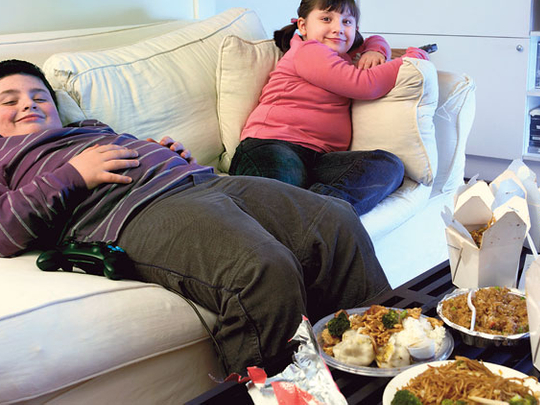
Dubai: Over 32 per cent of schoolchildren in Dubai are overweight or obese, latest statistics from a Beat Obesity Campaign reveals.
The findings are results of health camps and obesity tests conducted on 1,071 students across nine schools in Dubai. As many as 343 children came under the overweight or obese category.
A Landmark Group initiative, organised in collaboration with the Knowledge and Human Development Authority (KHDA) and Zulekha Hospital, the survey will eventually cover a total of 18 private and government schools across the city. Campaigns will be held in another 100 schools to spread awareness about childhood obesity and juvenile diabetes.
The campaign is a three-pronged approach to educate schoolchildren about the dangers of diabetes connected to obesity.
As part of the campaign, KHDA conducted Dubai School Football league Championships amongst 48 schools to promote an active lifestyle. Besides an ongoing awareness drive across 100 schools, fitness and health camps are being held in 18 schools where doctors from Zulekha Hospital are conducting BMI tests of children to ascertain their fitness levels.
A study by the UAE Ministry of Health, Centre for Disease Control in the US and the World Health Organisation states that as per 2010 statistics, 54.7 per cent of children living in the UAE between the ages of six and 16 fall under the overweight and obese bracket. In 2009, the figure was 26 per cent. The final results of the Beat Obesity Campaign, when concluded at the end of May, will reveal whether that trend is on an upward or downward spiral.
"Obesity can be viewed as metabolically unhealthy. It opens the doors to all sorts of health problems," says Nafeesa Ahmad, Director, Nutrition and Lifestyle Management at Zulekha Health Care Group. "Overweight youth are now developing adult-type diseases and have a higher frequency of Type 2 diabetes, high blood lipids, high blood pressure, early maturation, gynaecological abnormalities, pulmonary diseases, skin disorders and orthopaedic problems. These conditions worsen as the degree of obesity increases."
A Landmark spokesperson said 48 per cent of schoolchildren in Dubai require dietary intervention, regardless of obesity levels.
To combat the health risks that a child encounters due to weight issues, Ahmad Abdul Rahman, Project Manager, Princess Haya Initiative for the Development of Health, Physical Education and School Sports, on behalf on KHDA, advises "students to live an active, healthy life", adding that "schools should provide more physical activity time for obese students and introduce nutrition education in their curriculum" and that KHDA and the Princess Haya Initiative "will always support schools to have better health and nutrition programmes".
Huge problem
Overweight: A state in which weight exceeds a standard based on height; having a body mass index of 25 to 29.9 or greater
Obese: A state of adiposity in which body fatness is above the ideal; a body mass index of 30 to 39.9
Morbidly obese: A state of adiposity in which body weight is 100 per cent above the ideal body weight; a body mass index of 45 or greater
Input courtesy: Zulekha Hospital












